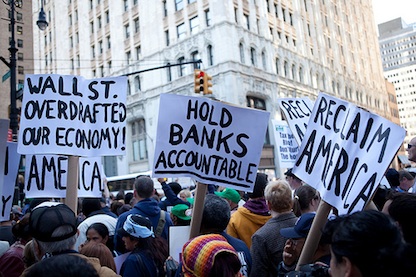Financial Reform in Peril
Lawmakers, bankers and experts say some problems that brought down the financial system have yet to be solved.
Jul 31, 2020292.3K Shares6.4M Views
Lawmakers say more work is needed to reform Wall Street. (Flickr: Pamhule)
Soon after Rep. Brad Miller (D-N.C.) came to Washington in 2002, a fellow member of the House Financial Services Committee told him to pick an arcane financial issue — any issue — and to make it his pet topic. Miller chose mortgage finance. He knew little about it. Banking lobbyists peppered him with data, but he had difficulty getting much information from independent sources.
[Economy1] “I was even reduced to reading blogs,” he quipped to a crowd of bankers, community organizers, financial reform experts, hedge fund managers and government aides at the Roosevelt Institute’s conference, “Financial Reform: Will It Work? How Will We Know?” on Monday. But Miller educated himself on the topic and became a leader in pushing for stronger regulation of mortgage products. By 2008, as the financial system collapsed, all of his colleagues in Congress had joined him in reading up on everything from liar loans to naked credit-default swaps.
That period of intense interest is over following the passage of financial regulatory reform legislation this summer, Miller and others said on Monday. But that does not mean that reform is done. In fact, because political attention has flowed from Wall Street to immigration, unemployment and myriad other topics, reform is imperiled. The regulatory law gave guidelines for fixing the financial sector, but the rule-writing process has fallen to dozens of agencies and government bureaucrats currently hammering out the details. That means the real work of reform is just beginning and the country is only incrementally closer to a safer financial system.
“It has become quite clear in recent years that the servant’s servant has become the master’s master,” argued Rob Johnson, a former hedge fund manager and current director at the Roosevelt Institute. Banks, he said, which should help companies merge, access credit and grow, instead ended up leeching off of them, piling on fees and unnecessary products. Ultimately, average Americans suffered. “We do not yet have a balance between society, the real economy and the financial sector.”
A few visiting investors noted that the sector has become more concentrated — due to a number of banks failing, and the others picking up their business — and therefore more dangerous. Each one of the systemically risky banks, like Goldman Sachs, has become more systemically important and therefore more likely to receive government backing if financial troubles re-emerge. (It will take years for Washington to put capital requirements and other safeguards in place.) Moreover, the long process of rule-writing allows banks ample time and opportunity to lobby bureaucrats working on legislation.
And that rule-writing is ongoing among dozens of agencies, including the Securities and Exchange Commission, the Federal Deposit Insurance Corporation, the Commodity Futures Trading Commission, the Treasury Department and the Federal Reserve. The government is also in the process of organizing and hiring workers for the new $500 million Consumer Financial Protection Bureau. And the massive legislation is drawing major lobbying interest. This campaign cycle, the American Bankers Association has pledged $13.6 million on lobbying and $2.1 million to campaigns, pushing for looser rules on banks. J.P. Morgan Chase alone has contributed nearly a million to campaigns this year.
So how will those interested in reform know if it is working in the meantime? The question posed to the gathering of 40 or so met with many answers. “[Reform] would be working if the banks were making a lot less money,” Miller argued. “The reality is for it to be successful it has to be a win-lose-win,” with markets and consumers winning, and banks losing. The Wall Street Journal reportedyesterday that financial-sector corporate profits are near their all-time highs.
Sen. Jeff Merkley (D-Ore.) was more optimistic. He praised the reform process, citing the creation of the Consumer Financial Protection Bureau, derivatives reform and proprietary trading regulations as big wins. (Elizabeth Warren, the White House and Treasury advisor helping to build the new bureau, attended the conference but did not speak.)
Still, Merkley conceded, “There is more to do.” He noted that ratings agencies — which stamped triple-A ratings on hundreds of billions of dollars of worthless mortgage-backed products in the run-up to the recession — remained unfixed. (“They’re almost useless,” sighed Jerome Fons of Kroll Bond Ratings agency.)
Others pointed to problems with the derivatives clearinghouses, which might now be the new “too big to fail” institutions. (If banks post insufficient capital to cover their derivatives trades, and another credit crunch hits Wall Street, with investors pulling cash out, the government might be forced to bail them out to calm the markets.) Some criticized the new Treasury Department Office of Financial Research, tasked with understanding Wall Street’s new innovations. Dozens of such niche issues arose.
“There are the tools there to do this,” Mike Konczal, a Roosevelt fellow, said. “Now it’s an issue of political will. [The financial regulatory law] doesn’t presuppose that [reform] will happen. But it does have the tools to do it.”
He concluded: “Those tools sit there, and there’s going to be a lot of pressure not to use them.”

Hajra Shannon
Reviewer
Hajra Shannona is a highly experienced journalist with over 9 years of expertise in news writing, investigative reporting, and political analysis.
She holds a Bachelor's degree in Journalism from Columbia University and has contributed to reputable publications focusing on global affairs, human rights, and environmental sustainability.
Hajra's authoritative voice and trustworthy reporting reflect her commitment to delivering insightful news content.
Beyond journalism, she enjoys exploring new cultures through travel and pursuing outdoor photography
Latest Articles
Popular Articles
